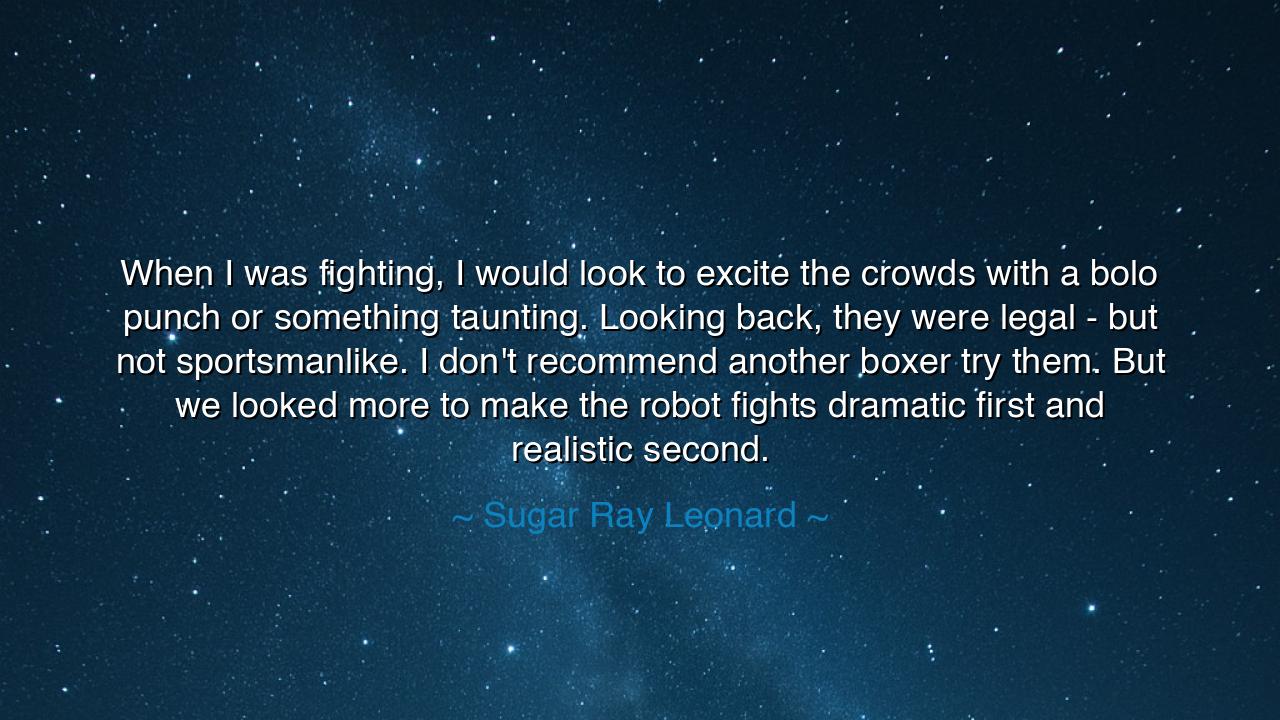
When I was fighting, I would look to excite the crowds with a
When I was fighting, I would look to excite the crowds with a bolo punch or something taunting. Looking back, they were legal - but not sportsmanlike. I don't recommend another boxer try them. But we looked more to make the robot fights dramatic first and realistic second.






There is a certain wisdom that only a warrior in reflection can speak — a wisdom born not from victory, but from understanding what victory costs. So said Sugar Ray Leonard, one of boxing’s great artists of motion and will: “When I was fighting, I would look to excite the crowds with a bolo punch or something taunting. Looking back, they were legal — but not sportsmanlike. I don't recommend another boxer try them. But we looked more to make the robot fights dramatic first and realistic second.” In these words, the champion lays bare a truth that reaches beyond the ring: that even within the rules, one can lose sight of the spirit of honor, and that glory pursued for spectacle alone can drift from the path of integrity.
In the golden era of boxing, Leonard dazzled the world with his grace — his movements flowed like a dancer’s, his fists struck like lightning guided by rhythm. He fought not merely to win, but to excite the crowd, to stir their souls with the beauty of motion and the thrill of danger. His famous bolo punch, a deceptive swing designed to confuse opponents and delight spectators, symbolized both his creativity and his showmanship. Yet, as he looks back, Leonard recognizes that beneath the applause, something sacred was at stake — the spirit of sportsmanship, the invisible code that binds warriors in mutual respect. He speaks now not as the fighter who sought cheers, but as the man who understands the weight of those choices.
In this, we see a struggle as old as combat itself: the battle between honor and spectacle, between the purity of the contest and the lure of the crowd’s approval. The ancient gladiators of Rome faced this same temptation. Some fought for survival, others for glory, but many, lured by fame, turned their battles into performances for the roaring masses. They knew that even as they won the crowd, they might lose themselves. The arena has changed, but the test remains the same — whether in sport, art, or life, the question echoes: do we act for truth, or for applause?
Leonard’s reflection also reveals a deeper humility, a willingness to see his younger self with honest eyes. He does not condemn the past, but he recognizes its flaw: that legality is not the same as morality. There are acts permitted by rules that still diminish the spirit; there are victories that leave one hollow. The taunting gestures, the theatrical punches — they were meant to entertain, yet they distanced the fighter from the noble art of measured combat. In realizing this, Leonard transcends mere athleticism and becomes a philosopher of his craft, teaching that greatness lies not in dazzling others, but in mastering oneself.
One might recall the tale of Miyamoto Musashi, the legendary Japanese swordsman who, after countless duels, laid down his blade to write The Book of Five Rings. Musashi too had once sought spectacle — fighting with twin swords, defeating enemies with unpredictable moves. But in his later years, he came to understand that the true warrior’s path was not to defeat others, but to discipline his own soul. Leonard’s words carry this same spirit: the awakening from performance to principle, from ego to enlightenment.
The phrase “robot fights dramatic first and realistic second” speaks metaphorically of how the modern world often prizes appearance over authenticity. We see this in sports, in politics, in daily life — people perform rather than live, gesture rather than act, speak rather than mean. Leonard’s acknowledgment serves as a mirror to all who strive in public arenas: that when we begin to fight for the spectacle, we become mechanical, disconnected from the human essence that once made our pursuit noble. The lesson is not to reject artistry, but to restore balance — to remember that drama without integrity is only illusion.
Let this teaching pass to the generations that follow: do not confuse admiration with virtue. The cheers of the crowd are fleeting, but the quiet of conscience is eternal. Whether you are an athlete, an artist, or a worker in humble fields, strive first to be right, not radiant; honest, not adored. The world will always hunger for entertainment, but it is your soul that must choose whether to be the flame or the shadow it casts.
In the end, Sugar Ray Leonard’s reflection stands as a testament to evolution — not of muscle, but of spirit. The young fighter thrilled the world; the elder teaches it. He reminds us that even in victory, there is room for grace; that the mark of a true champion is not in the flash of the punch, but in the strength to say, “I could have done better.” From such humility arises greatness that no belt can measure — the greatness of character, which outlives both applause and time.






AAdministratorAdministrator
Welcome, honored guests. Please leave a comment, we will respond soon